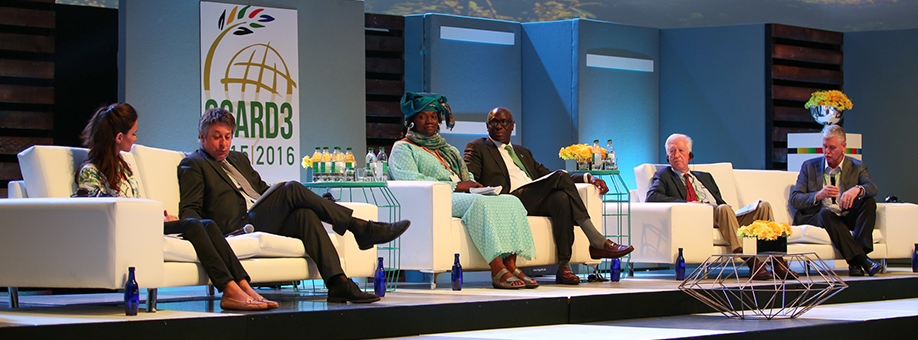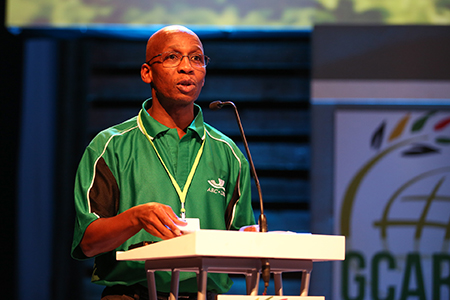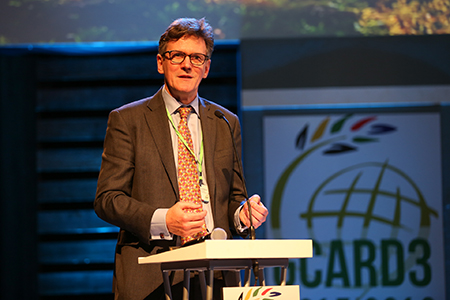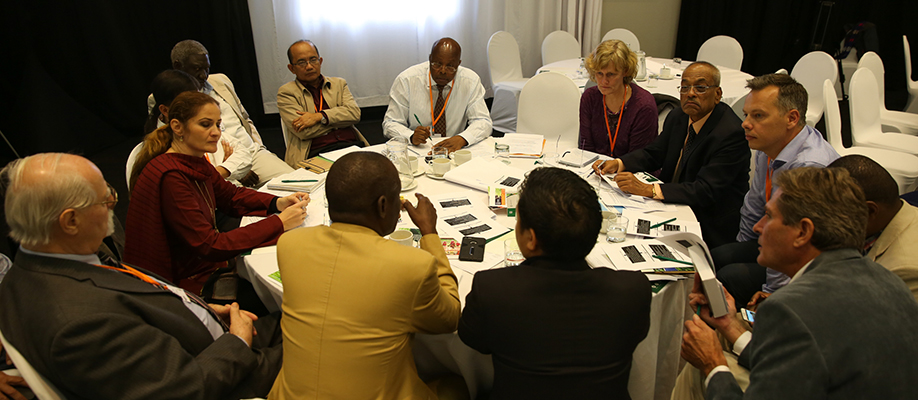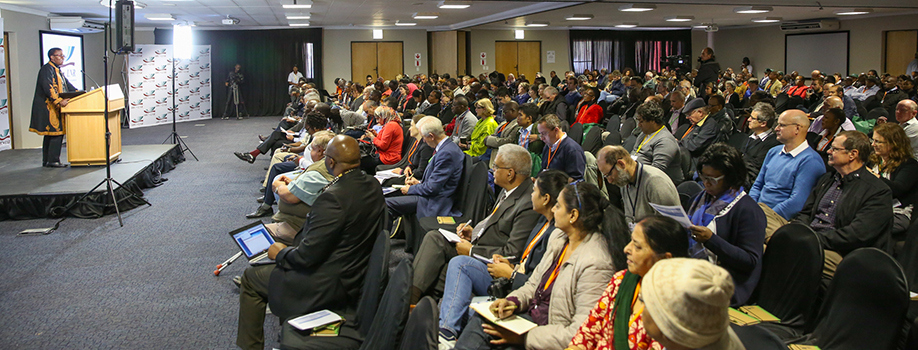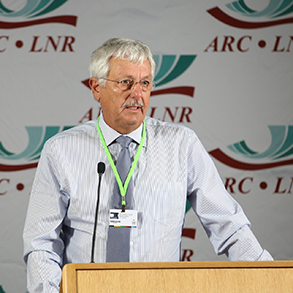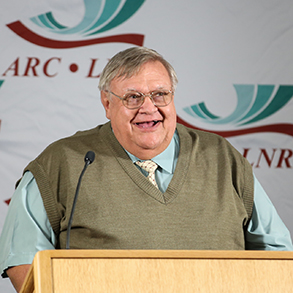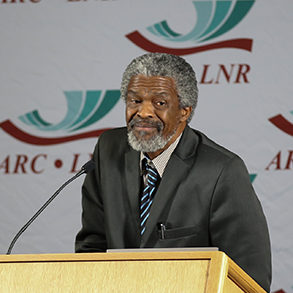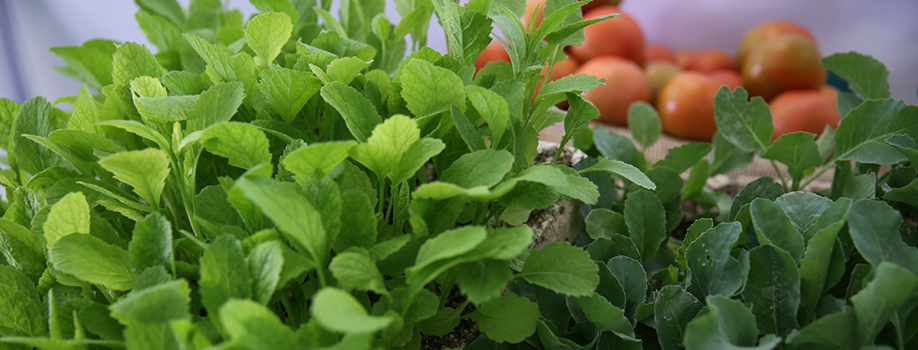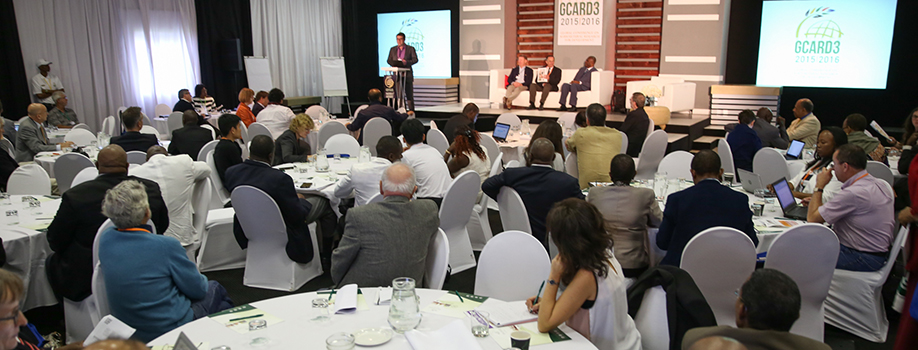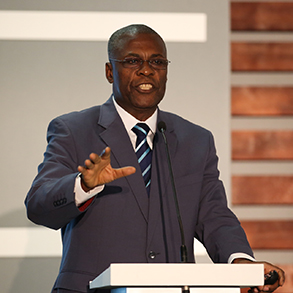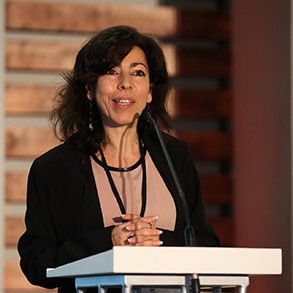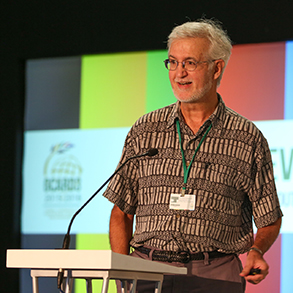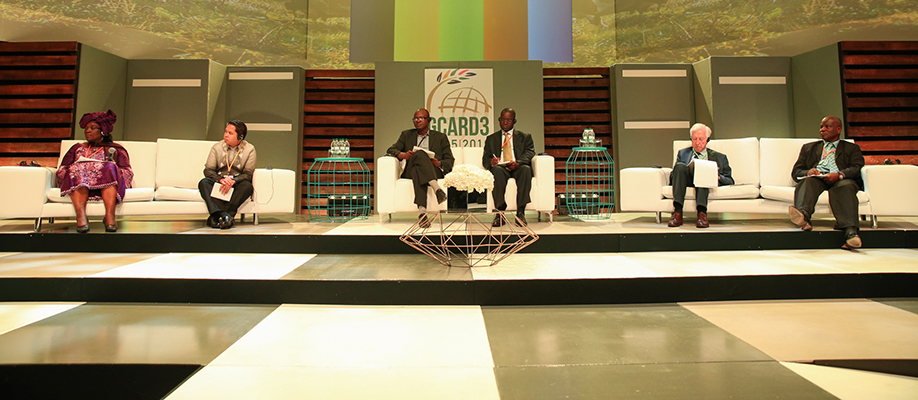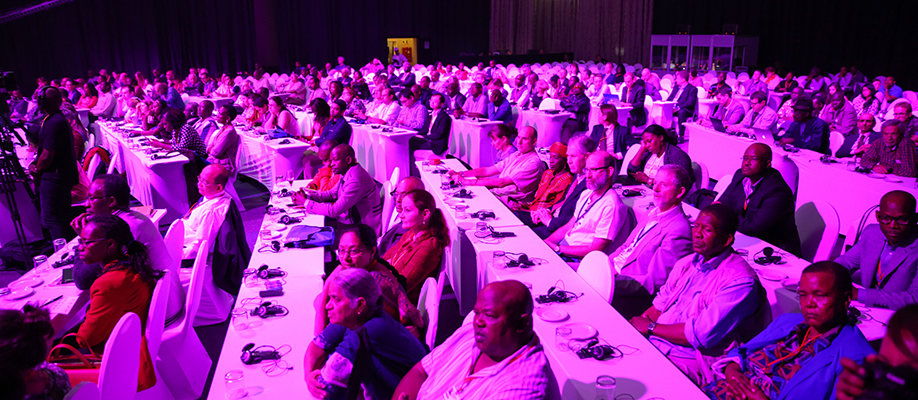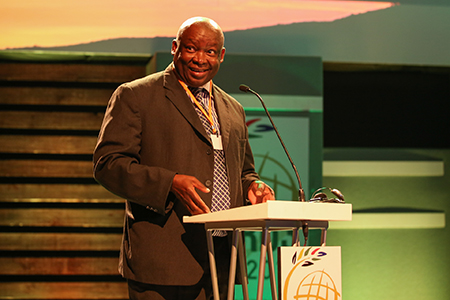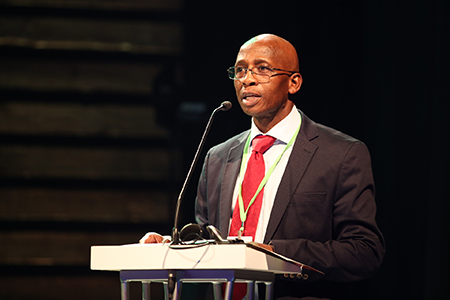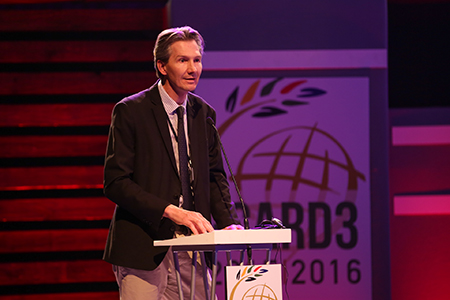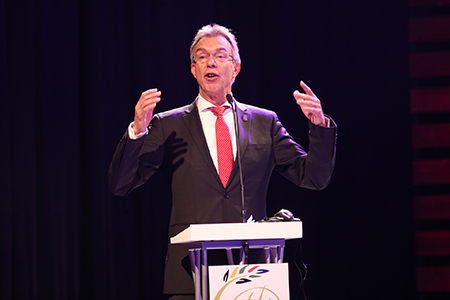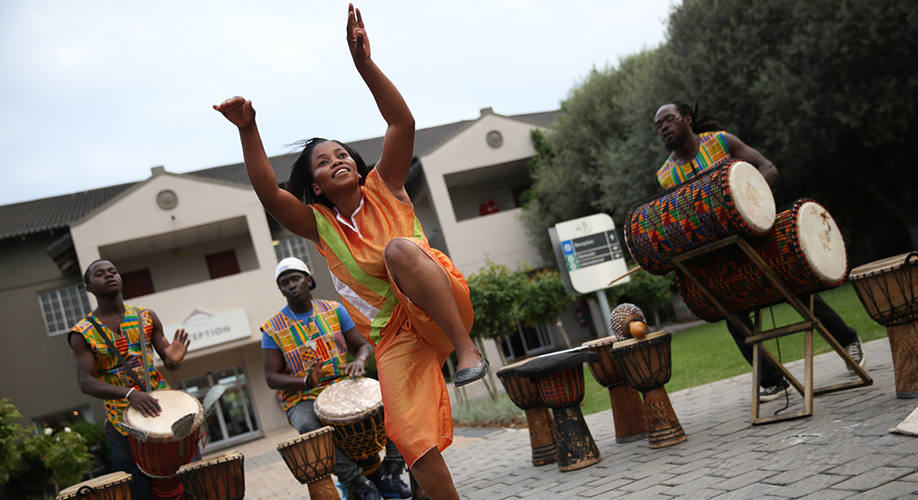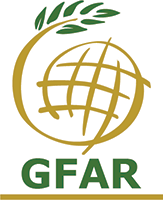3rd Global Conference on Agricultural Research for Development (GCARD3)
No One Left Behind: Agri–food Innovation and Research for a Sustainable World
5-8 April 2016 | Boksburg, South Africa
Summary Highlights of GCARD3, 5-8 April 2016
Download ENB+ Meeting Report |
||||||
Receive our ENB+ bulletins and reports by email: |
||||||

| Follow @iisdrs | ||

Loading... |
||
|
Receive emailed updates with the news articles above plus related information and announcements from our SDG community mailing list: |
||
Friday, 8 April 2016
|
In the afternoon, participants convened in plenary for presentation of the Youth Agripreneurs Project (YAP) awards. Peter Casier, Independent Consultant, introduced five of the six YAP finalists from Barbados, India, the Philippines, Ethiopia and Kenya who each described their winning projects. Following an overview by Chairs and Co-chairs of the key messages from the two days of thematic discussions, Shadrack Moephuli, President and CEO, ARC, presented the draft GCARD3 Outcomes Statement for adoption. He noted that the Outcomes Statement sketches the overall context of the GCARD3 Global Event and the five key challenges that were explored during the thematic discussions. Moephuli then highlighted the main messages and commitments that emerged from the five thematic groups, noting commitments to, inter alia: establish innovative, farmer-led platforms; create 1,000 additional PhDs per year in “next-generation, future-relevant agricultural research”; continue professional development in agriculture for innovation and entrepreneurship; develop a “culture of impact”; contribute to national measurements of progress and create a platform to harmonize agriculture-related indicators linked to the Sustainable Development Goals (SDGs); build value chain partnerships, while protecting smallholder farmers’ access to resources and developing their business skills; and address cross-cutting themes such as public health and nutrition in agricultural research and innovation programmes. A final high-level panel discussion moderated by Frank Rijsberman, CEO, CGIAR Consortium, provided regional and global perspectives relating to the GCARD3 outcomes. Mariam Al Jaajaa, The Arab Network for Food Sovereignty/Arab Group for the Protection of Nature, highlighted the growing problem of food insecurity due to protracted crises in the Near East and North Africa region, and stressed the need for comprehensive research to understand the root causes and devise strategies to create a better future. Bernard Rey, European Commission, highlighted the jointly funded and co-owned EU-Africa Partnership on Research and Innovation on food and nutrition security and sustainable agriculture. Elisabeth Atangana, Plate-forme Régionale des Organisations Paysannes d’Afrique Centrale (PROPAC) underlined the need for science to evolve and adapt to communities’ demands. Sana Jatta, International Fund for Agricultural Development (IFAD), recommended deeper involvement of developing country governments in the GCARD process. Charles-Ferdinand Nothomb, Minister of State, Belgium, called for increasing resources in rural communities through government lobbying and decentralization. In his vote of thanks Rijsberman noted the Conference had offered an invaluable networking opportunity and welcomed the feedback provided by various stakeholders on how to align the new Strategic Framework with national and regional priorities. Noting that “for first time, we have bridged science and society to shape our futures,” Mark Holderness, Executive Secretary, GFAR, expressed appreciation for the willingness shown by more than 500 GCARD3 delegates from 83 countries “to go forward together.” He noted that the Conference has shaped a package of tangible actions that “we can proudly take to the SDGs review process.” Litha Magingxa, Agricultural Research Council (ARC), thanked partners, organizing committees, theme Chairs and Co-chairs, ‘catalysts,’ participants and all others involved in the organization and facilitation of the event. He declared GCARD3 closed at 5:35 pm. |
||
IISD Reporting Services, through its ENB+ Meeting Coverage, provided daily web coverage from GCARD3. In addition, IISD Reporting Services has produced a summary report from GCARD3, which is available in HTML and PDF formats. |
||
+ Visit the web coverage for Friday, 8 April 2016 | ||
|
|
|
|
Thursday, 7 April 2016
|
Opening the event, Lindiwe Sibanda, Chief Executive, Food, Agriculture and Natural Resources Policy Analysis Network (FANRPAN) and Chair, ARC Day, thanked the GCARD3 hosts for the opportunity to learn more about the ARC’s journey, noting “their success is our success.” Sibusiso Vil-Nkomo, Chair, ARC Council, welcomed delegates, noting the importance of the agricultural sector in Africa’s development. Moshe Swartz, Acting Deputy Director-General, Department of Land Redistribution and Development, South Africa, emphasized that the country’s agrarian transformation strategy is firmly embedded in the constitution, and seeks to build vibrant and sustainable rural communities “who are the masters of their own destiny.” He described several joint initiatives with the ARC, including a project to recover hundreds of lost indigenous vegetables and medicinal plants, and the Agricultural Para-Professional Development Programme, which aims to contribute to “perpetual knowledge creation” for rural development. In a set of presentations focusing on the evolution of the ARC, current and former programme staff highlighted some key successes and lessons learned since the establishment of the institute in 1992. Michiel Scholtz described support schemes for emerging farmers and noted a significant rise of the ARC-Animal Production Institute's scientific publications in recent years. Reflecting on the growth of the ARC-Field Crops division, Cobus le Roux explained the institute had managed to adapt to challenges by forging closer working relationships with government, industry, academic institutions, and value chains at large. He said this had enabled the ARC to secure the necessary financial security and prove its relevance within the agricultural sector. Outlining the ARC’s transition process from an idea to an internationally renowned institution, Org van Rensburg highlighted some successful research and development projects, including establishing high value crops in the Eastern Cape, developing plant breeding programmes and identifying disease resistant guava selections. Summarizing some lessons learned over the past 25 years, Shadrack Moephuli, President and CEO, ARC, identified the ARC’s resilient approach as a key success factor in adapting to changing conditions and challenges to ensure impact and continued relevance over time. In the afternoon, participants met in thematic parallel sessions highlighting diverse ARC research and development programmes in the areas of: animal and crop production for food security; sustainable use of natural resources; and agricultural technologies for market access among smallholder and commercial farmers. Presentations covered the ARC’s work in, among other areas, biotechnology and livestock genomics, vaccine development, rural enterprise development, socioeconomic impact analysis and farmer training and extension. In a panel session focusing on agriculture science and technology policies, diverse South Africa-based organizations described key challenges and pathways to achieve sustainable development outcomes. In a second panel, six young female scientists involved in the Professional Development Programme described how the programme has contributed to their academic and professional development. The day closed with site visits to ARC field project sites as well as to the ARC Biotechnology Platform located at the Onderstepoort Veterinary Institute campus. |
||
+ Visit the web coverage for Thursday, 7 April 2016 | ||
|
|
Wednesday, 6 April 2016
|
The opening plenary concluded with two keynote addresses by youth representatives. Jim Cano, Young Professionals for Agricultural Development (YPARD), posed the challenge of getting youth interested in agriculture. Dimakatso Sekhoto, Makolobane Farmers Enterprises, discussed her vision for contributing to agricultural transformation in South Africa as a young, emerging, black, female farmer. Delegates then convened in parallel discussion sessions for the rest of the day, focusing on the five GCARD3 themes of: ‘Scaling up - from research to impact’; ‘Showcasing results and demonstrating impact’; ‘Keeping science relevant and future-focused’; ‘Sustaining the business of farming’; and ‘Ensuring better rural futures.’ The discussions were facilitated by ‘catalysts’ who presented key challenges, opportunities and emerging issues. Round table discussions then took place to elicit concrete lessons and future-oriented recommendations that will be included in the Conference’s final outcome. Discussions under the first theme were chaired by Patrick Caron, French Agricultural Research Centre for International Development (CIRAD) and co-chaired by Judith Francis, Technical Centre for Agriculture and Rural Cooperation ACP-EU (CTA). These addressed how to scale up research through improved linkages and learning across the local, national, regional and global levels. Presentations highlighted strategies for achieving scale in research for impact drawing on theories, case studies and tools to facilitate and evaluate impact. The second theme was chaired by Thomas Price, GFAR and co-chaired by Dhanush Dinesh, CGIAR Research Program on Climate Change, Agriculture and Food Security (CCAFS), and focused on experiences from different organizations involved in agricultural research and innovation in showcasing their research results and demonstrating impact. Under the third theme, which was chaired by Aissétou Yayé, African Network for Agriculture, Agroforestry and Natural Resources Education (ANAFE), and co-chaired by Wayne Powell and Shoba Sivasankar, CGIAR, the discussions highlighted challenges, perspectives, strategies, solutions and collective actions needed to scale-out individual and institutional capacity development. The fourth theme, chaired by Jethro Greene, Caribbean Farmers’ Network (CaFAN) and co-chaired by Pamella Thomas, CaFAN, and Naledi Magowe, Brastorne Enterprises, explored how agri-food research and innovation partners across the spectrum of research, education, extension and business can support each link in the value chain. Under the fifth theme, which was chaired by Iman El-Kaffass, Independent Consultant, and co-chaired by Courtney Paisley, YPARD, the discussions addressed grassroots and regional perspectives in ensuring better rural futures, with a focus on: milestones, outputs and outcomes; and partnerships and resources needed towards collective action. |
||
+ Visit the web coverage for Wednesday, 6 April 2016 | ||
|
|
|
|
|
Tuesday, 5 April 2016
|
In the GCARD3 official opening, welcoming delegates, Shadrack Moephuli, President and CEO, ARC, noted the growing challenge of sustaining agricultural production and reducing poverty and hunger at a time of economic downturns and climatic variations. He called on the agricultural research for development (AR4D) community to tackle chronic hunger and malnutrition and contribute to sustainable agricultural production. Mortimer Mannya, Acting Director-General, Department of Agriculture, Forestry and Fisheries, South Africa, speaking on behalf of Minister Senzeni Zokwana, highlighted South Africa’s target of creating at least one million agricultural jobs and increasing the share of smallholder producers, noting the importance of evidence-based research and smart and innovative solutions. Juan Lucas Restrepo, Chair, GFAR Steering Committee, noted that GFAR’s first partner assembly on Tuesday had brought together approximately 100 partners to update GFAR’s charter. He encouraged delegates to view GCARD as a process that addresses new issues and includes voices from the different regions, requiring ongoing discussion. Martin Kropff, Director-General, International Maize and Wheat Improvement Center, emphasized the challenges of natural resource depletion, water scarcity, climate change, and food insecurity and noted that GCARD3 would help to advance the 16 CGIAR Research Programs (CRPs). In his keynote address, Hamady Diop, Head, Fisheries and Aquaculture Program, NEPAD Agency, highlighted the need to: ensure research is aligned with and responsive to demand; reset national and global priorities after adoption of major sustainable development agreements in 2015; and take note of changes in key development parameters, including instability of financial markets and the growth of information and communications technology. He identified agriculture and climate change, enhancing water productivity, and biofuels as research priorities for Africa and stressed the importance of empowering national agricultural research systems and the role of farmers and other practitioners in agricultural research. In her keynote address, Lindiwe Majele Sibanda, Chief Executive, Food, Agriculture and Natural Resources Policy Analysis Network (FANRPAN), highlighted climate change and malnutrition as two "wicked problems" facing the AR4D community. She lauded the work done by the Global Alliance for Climate-Smart Agriculture (CSA) and the Africa CSA Alliance, which aims to introduce CSA to six million farming households by 2030, as encouraging examples of practical research. Warning that if current rates of child stunting in Africa continue it will affect the intellectual capacity of future generations, Sibanda urged GCARD3 stakeholders to ensure that “agriculture delivers healthy diets.” |
||
+ Visit the web coverage for Tuesday, 5 April 2016 | ||
|
|
|
|
|
|


